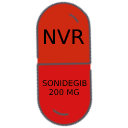Uses
Sonidegib is used to treat basal cell carcinoma (BCC; a type of skin cancer) in adults with cancer that has come back after surgery or radiation, or in adults that cannot be treated with surgery or radiation. Sonidegib is in a class of medications called hedgehog pathway inhibitors. It works by blocking the action of a protein that signals cancer cells to multiply. This helps stop or slow the spread of cancer cells and may help shrink tumors.
Side Effects Of Sonidegib
Sonidegib may cause side effects. Tell your doctor if any of these symptoms are severe or do not go away:
- diarrhea
- abdominal pain
- loss of appetite
- weight loss
- nausea
- vomiting
- change in the ability to taste food
- hair loss
- itching
- weakness
- extreme tiredness
- pain
- missed menstrual periods
Some side effects can be serious. If you experience any of these symptoms, stop taking sonidegib and call your doctor immediately:
- muscle spasms
- unexplained muscle pain, tenderness, or weakness
- dark or cola-colored urine
- decreased urination
- inability to urinate
- Sonidegib may decrease fertility in women. Talk to your doctor about the risks of taking sonidegib if you have concerns about fertility.
- Sonidegib may cause growth to stop early in children. This medication is not recommended for use in children.
Sonidegib may cause other side effects. Call your doctor if you have any unusual problems while taking this medication.
Warnings & Precautions
Before taking sonidegib:
- tell your doctor and pharmacist if you are allergic to sonidegib, any other medications, or any of the ingredients in sonidegib capsules. Ask your pharmacist or check the Medication Guide for a list of the ingredients.
- tell your doctor and pharmacist what prescription and nonprescription medications, vitamins and nutritional supplements you are taking or plan to take. Be sure to mention any of the following: atazanavir (Reyataz); certain antifungals such as fluconazole (Diflucan), itraconazole (Onmel, Sporanox), ketoconazole, posaconazole (Noxafil), and voriconazole (Vfend); diltiazem (Cardizem, Cartia, Tiazac, others); efavirenz (Sustiva, in Atripla); modafinil (Provigil); nefazodone; rifabutin (Mycobutin); rifampin (Rifadin, Rifamate, Rifater, Rimactane); saquinavir (Invirase); certain medications for seizures such as carbamazepine (Carbatrol, Epitol, Equetro, Tegretol, Teril), phenobarbital, and phenytoin (Dilantin, Phenytek); and telithromycin (Ketek). Your doctor may need to change the doses of your medications or monitor you carefully for side effects. Many other medications may also interact with sonidegib, so be sure to tell your doctor about all the medications you are taking, even those that do not appear on this list.
- tell your doctor what herbal products you are taking, especially St. John’s wort. Your doctor will probably tell you not to take St. John’s wort while taking sonidegib.
- tell your doctor if you have or have ever had muscle disease.
- tell your doctor if you are breastfeeding. Your doctor may tell you not to breastfeed while you are taking sonidegib and for 20 months after your treatment.
Dosage Of Sonidegib
Sonidegib comes as a capsule to take by mouth. It is usually taken once a day on an empty stomach, at least 1 hour before or 2 hours after a meal. Take sonidegib at around the same time every day. Follow the directions on your prescription label carefully, and ask your doctor or pharmacist to explain any part you do not understand. Take sonidegib exactly as directed. Do not take more or less of it or take it more often than prescribed by your doctor.
Your doctor may need to interrupt or stop your treatment depending on your response to sonidegib and any side effects that you experience.
Other
Keep all appointments with your doctor and the laboratory.
Do not let anyone else take your medication. Ask your pharmacist any questions you have about refilling your prescription.
It is important for you to keep a written list of all of the prescription and nonprescription (over-the-counter) medicines you are taking, as well as any products such as vitamins, minerals, or other dietary supplements. You should bring this list with you each time you visit a doctor or if you are admitted to a hospital. It is also important information to carry with you in case of emergencies.
Source
All information has been provided courtesy of MedLinePlus from the National Library of Medicine and from the FDA.



